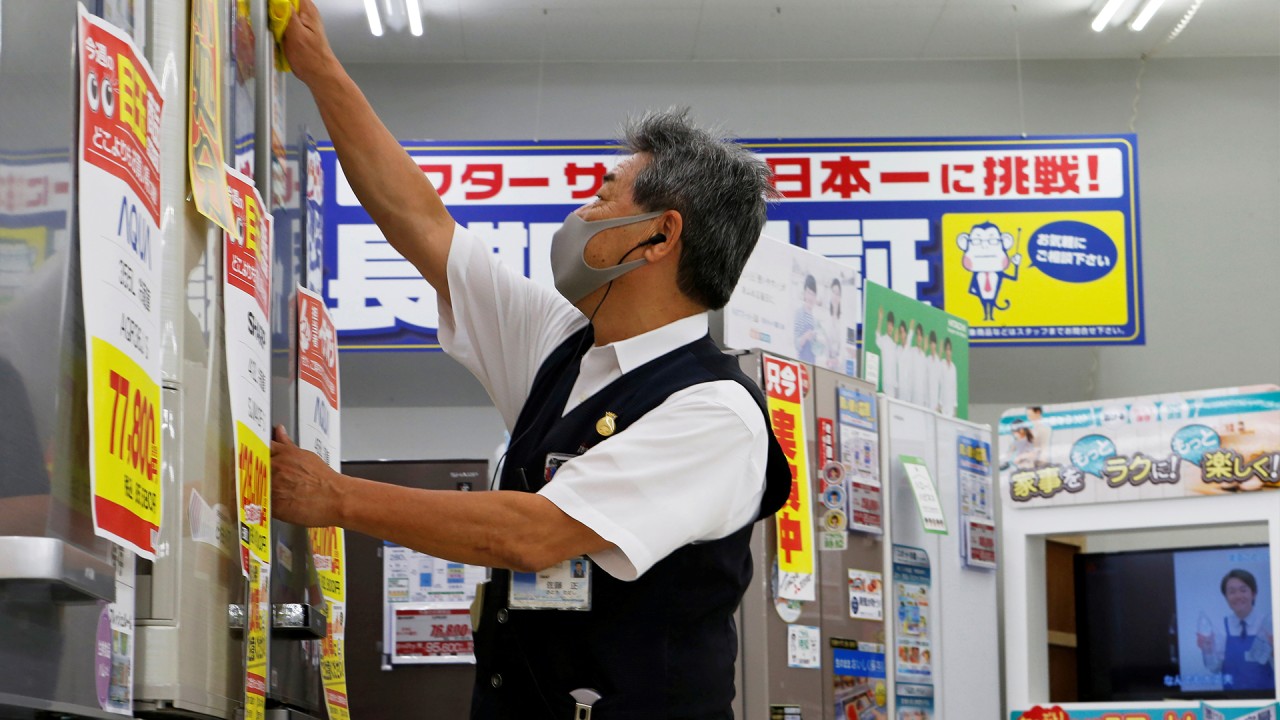
Coronavirus leaves China’s over-35s with uncertain job prospects
- Amid a tough job market, Chinese jobseekers above age 35 are feeling increasingly insecure about their future
- Many firms are seen as favouring young and energetic graduates in China, where age discrimination is not illegal
For some Chinese workers, celebrating their 35th birthday is starting to feel like a curse.
Amid the frenzied competition for jobs stirred up by the economic impact of the pandemic, a growing number of employment ads are imposing age limits of 35 – leaving many Chinese nearing middle age feeling uncertain about their future.
Complaints about age discrimination in the job market – including for positions in the civil service – have flooded Chinese social platforms, and state media even have a name for the trend: the “age 35 phenomenon”.
David Huang, who is in his forties, is one of the scores of Chinese workers above 35 feeling increasingly vulnerable. After the small clothing factory he owned in the southern province of Guangdong closed last year, he now traipses between wet markets and roadside stalls trying to sell his remaining inventory of about 10,000 garments.
I’m almost 50. Am I going to look for jobs? No. There’s nothing for me out there.
“I’m almost 50. Am I going to look for jobs? No. There’s nothing for me out there. Finding jobs is too difficult,” Huang said. “Just look at how bad business is in those clothing retail shops in Guangzhou, you will get an idea how bad wholesaling and manufacturing garments is at the moment.”
On Zhihu, China’s version of the American question and answer website Quora, a discussion thread called “How does a 40-year-old unemployed individual live on?” has clocked up more than 27 million views since 2019. In post after post, users share their frustration about trying to find work in their middle age.
And the situation only appears to have deteriorated with the pandemic.
Nearly two thirds of people aged 35 and above who were laid off in March last year were still looking for jobs in September, according to a report released last month by the Development Research Centre of the State Council, which was based on data and a survey from Chinese job portal Zhaopin.
From February to September, the number of people above 35 who submitted their resumes on Zhaopin increased by 15 per cent from a year earlier, more than double those under 35.
Resume submissions were particularly strong in industries that have been heavily affected by the pandemic, like retail and wholesale.
As a consequence, nearly half of the job applicants above 35 fell from middle or high-income groups to low income because their earnings had dropped, according to the study.
More than 70 per cent said they face pressure meeting mortgage payments and other costs, such as children’s education and medical bills. The study also estimated a third of them could only survive at current spending levels for 3 months.
Beijing has not yet announced its birth rate for 2020 or updated population figures after a nationwide census at the end of last year, but its birth rate is expected to have fallen again.
Despite this, many companies are seen as favouring young and energetic graduates over middle-aged workers because they can pay lower salaries for similar work.
The trend is most evident in China’s thriving tech sector, where a number of internet firms operate a sweatshop working culture known as “996” – 9am to 9pm, six days per week. Most developers over 35 are considered too old to handle the workload.
Tang Ying, 36, has found herself in the grips of insomnia and depression lately while grappling with the possibility of losing her job as a front desk administrative employee at a small tech firm in Guangzhou.
The past year has been a nightmare for Tang: her marriage fell apart and she contracted tuberculosis, an infectious disease affecting lungs.
When she went back to her job after recovering, the company gave her more work than usual, something she perceived to mean they wanted her to quit.
Many places only want people under 35. I have been battling with this thought a lot
Yet, she has stayed on, concerned her lack of a university degree will mean she is unable to find work elsewhere.
“I’m scared. I don’t have confidence in sending out resumes,” said Tang, who worked at a call centre as a customer service operator previously.
“Many places only want people under 35. I have been battling with this thought a lot. All I think of is trying to hold on to this job.”
The Zhaopin study found even though there are more job opportunities in low-tier cities than first-tier cities, many middle-aged jobseekers are hesitant to move their families out of China’s most developed and affluent regions, such as Guangzhou.
A graduate school degree and work experience for some of the nation’s biggest tech companies does not necessarily give you an edge either, said 38-year-old Jim Yang, whose position as a former salesman at telecoms giant Huawei was ended by the firm three years ago.

02:11
Japanese electronics retailer to let employees keep working until age 80 as labour force shrinks
The expansion of enrolments at tertiary institutions has made diplomas worth less than they were a decade ago, he said. No longer is it difficult for big companies to replace experienced workers, because often their knowledge has been captured in reports that can be picked up by fresh graduates.
Another obstacle for ex-employees of big companies like Huawei is that they have trouble meeting the multiple demands made by smaller firms, he said.
It took Yang three months to find a new job at a small robot manufacturer, where he had to take a lower salary. Some of his old colleagues, meanwhile, have gone back to Huawei as contractors on lower incomes and social benefits after struggling to find a job elsewhere.
“Among my friends above 35 who left Huawei, about 40 per cent have kept a decent life,” Yang said. “Even though they earn less than their Huawei years, they still have monthly incomes between 20,000 (US$3,092) and 40,000 yuan.”
If all you did is write reports in your old job, I can find a fresh graduate to do these things
“The other 60 per cent are a bit miserable. They have either been out of work for a long time and invested in stocks or are partnering with others to start a business, but don’t take salaries, only for dividends. Some have divorced with no job, sold their homes, and returned to their hometowns.”
Sunny Dong, a hiring manager at a Shanghai-based education consultancy, said many jobs set an age limit at 35 in China, but the requirement is not strict in all cases.
“I have recruiter friends who do not want applicants over 35 years old … but you give them a good candidate who knows lots of people at international schools for a marketing position and they still hire him. So it’s not absolute,” she said.
“Of course, there are also many unemployed people who are above 35. I have a lot of resumes here, born in 1980 or 1981, even some with a British green card, but they cannot find jobs in both Britain and China.
“If all you did is write reports in your old job, I can find a fresh graduate to do these things.”


